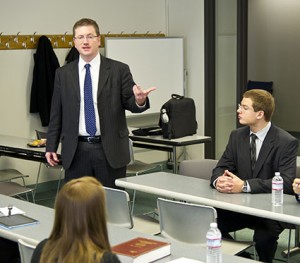 John Marshall Law School Professor William Ford would not deny that he’s a bit of a connoisseur of all sorts of games: video, role playing, card and board games. Among his favorites are video games like BioShock and Alan Wake and historical board games like Axis & Allies and Advanced Squad Leader. He even has a chock-full game closet at his home and is teaching his 5-year-old son to play some of the old classics and many less familiar games.
John Marshall Law School Professor William Ford would not deny that he’s a bit of a connoisseur of all sorts of games: video, role playing, card and board games. Among his favorites are video games like BioShock and Alan Wake and historical board games like Axis & Allies and Advanced Squad Leader. He even has a chock-full game closet at his home and is teaching his 5-year-old son to play some of the old classics and many less familiar games.
But games are also serious business for Ford, who teaches the Video Game Law seminar this semester. It proved so popular that shortly after registration for the course opened, each slot was filled and Ford had a waiting list. The new course was recently approved by the Faculty Assembly as a permanent part of the John Marshall course catalog.
“It is actually a serious topic. Academics are interested in it. University presses are publishing books related to games. And,” Ford noted, “there’s a lot of money involved in video gaming now and a lot of unresolved legal questions. It’s big business and ripe for study by law students.”
As the video game industry marks its 40th anniversary—tied to the 1972 release of the successful Pong game—it’s clear that video gaming has expanded beyond teen-aged boys. According to the Entertainment Software Association, 49 percent of U.S. households own a dedicated game console and the average game player age is 30. Indeed, even The New York Times is reviewing video games in its arts pages.
“Usually the students who sign up have an interest in video games, but sometimes there are students with little experience playing video games,” Ford said. “A bit of a surprise, but game playing is not a prerequisite.”
The course begins with a brief history of the video game industry and the technologically advanced classrooms at John Marshall allow for showing a video montage from some of the games. But after that historical component, the seminar moves on to the legal issues involved in gaming.
There’s a special focus on intellectual property issues dealing with topics covering patent, copyright and trademark laws for games. There also are issues of rights of publicity—when athletes, for example, are portrayed without their permission. And, free speech issues, especially when some games are age-restricted. The discussions of free speech issues extend to scientific research on the effects of video game violence on players and the subsequent legislative efforts to regulate access to video games.
Ford said his seminar follows the model for an Entertainment Law class but then emphasizes particular issues that are specific to the gaming industry.
Among the cases that Ford presents in his class is Palmer v. Schonhorn Enterprises, Inc., the first published decision regarding the use of someone’s name in a game. Arnold Palmer and other golfers were successful in contending that the company unfairly used their names and golfing achievements in a board game.
The Palmer case was decided in 1967, but other cases with similar issues in the video gaming arena are currently in litigation. In Keller v. Electronic Arts, Inc., Samuel Keller, the former starting quarterback for the Arizona State University and University of Nebraska football teams, contends that the company’s “NCAA Football” series of video games uses his likeness without his consent. The district court’s decision favoring Keller is currently on appeal before the United States Court of Appeals for the Ninth Circuit. Ford expects the court’s decision should come in time to enliven the semester’s discussion of the right of publicity.

